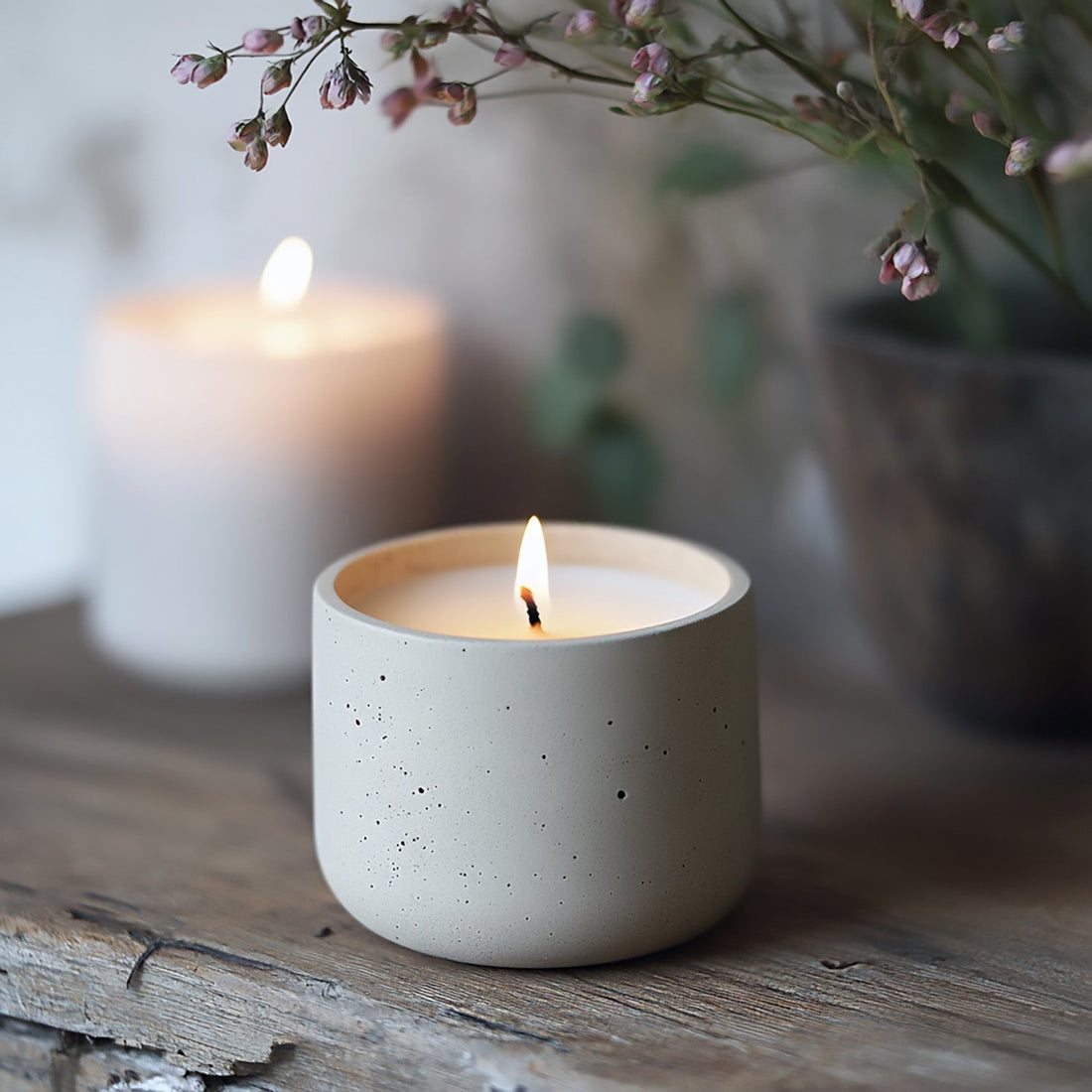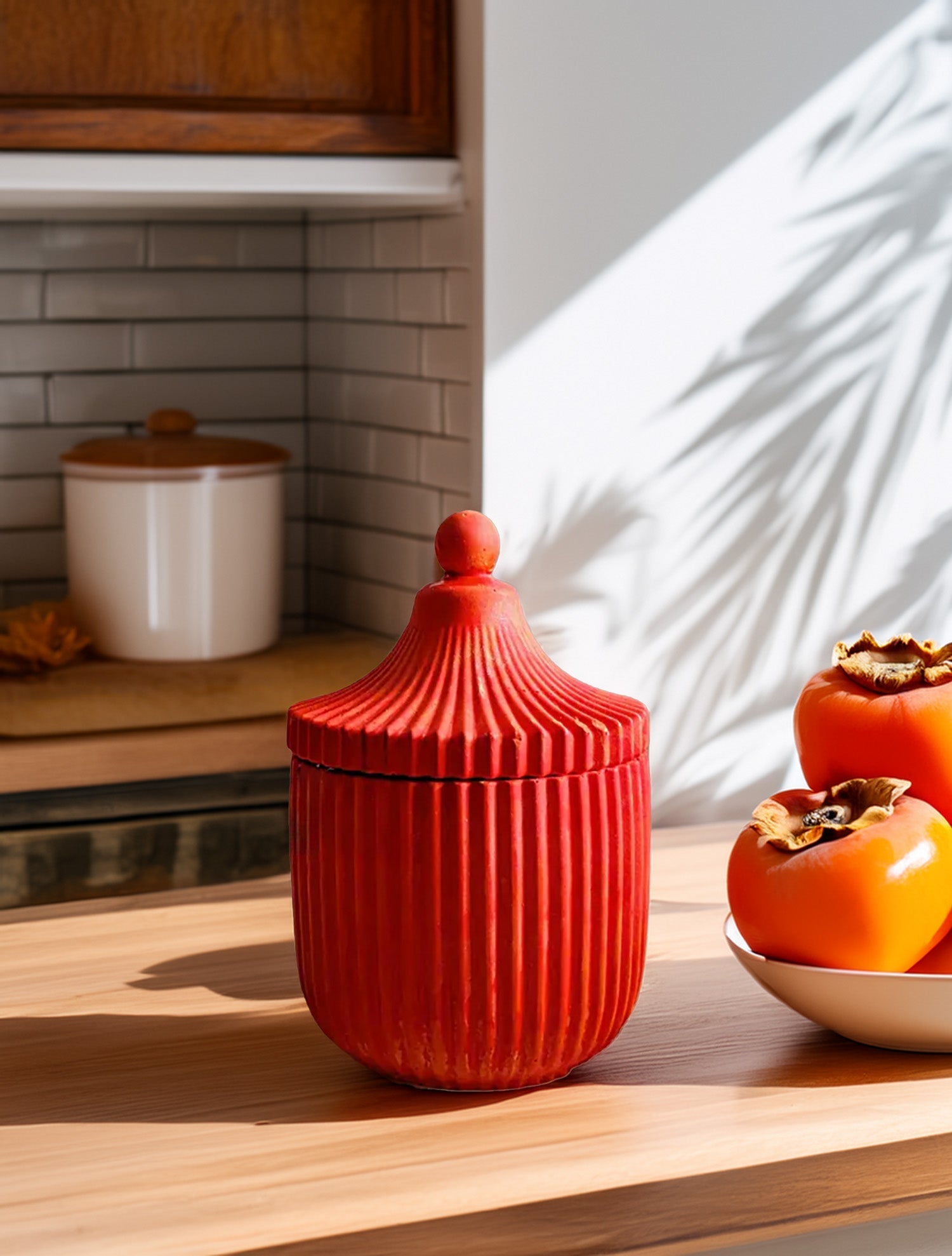
How Aromatherapy Candles Can Improve Your Mental Health and Sleep in 2025
Share

Last week, I lit a lavender candle after a particularly stressful day at work. Within minutes, the gentle aroma filled my living room, and I felt my shoulders relax. This simple act—lighting an aromatherapy candle—has become an important part of my evening routine.
In our busy world, finding natural ways to support mental health and improve sleep has become more important than ever. Aromatherapy candles offer a simple yet effective tool for creating a calming environment at home. These candles combine the soothing qualities of candlelight with the therapeutic benefits of essential oils.
This article will show you how aromatherapy candles work, which scents help with specific mental health concerns, what's new in the market for 2025, and how to choose the right candle for your needs.
TL;DR
Key points:
- Aromatherapy candles may help stress/sleep via direct scent pathways to your brain's emotional center
- Best oils: Lavender, chamomile, bergamot, sandalwood, clary sage
- Research is mixed: Benefits may partly come from expecting aromatherapy to work
- Not for everyone: Avoid if you have asthma, allergies, epilepsy, or migraines
- Use quality candles: Look for "organic" or "therapeutic grade" essential oils
- Consult a healthcare provider before trying aromatherapy if you have health concerns
The Science of Scent: How Aromatherapy Works
When you light an aromatherapy candle, the heat releases essential oil molecules into the air. As you breathe in these scented molecules, they travel to your nose's olfactory receptors. These receptors notice the molecules and send messages to your brain through your olfactory nerve.
According to research published in Frontiers in Behavioral Neuroscience, what makes the sense of smell unique is that "unlike the other sensory systems, the sense of smell does not pass through the thalamus to be routed to the cortex. Rather, odor information is relayed directly to the limbic system, a brain region typically associated with memory and emotional processes."
Harvard's Venkatesh Murthy, Raymond Leo Erikson Life Sciences Professor, explains: "Smell and emotion are stored as one memory." He notes that "the olfactory signals very quickly get to the limbic system," which includes the amygdala (involved in processing emotions) and the hippocampus (crucial for memory).
This direct pathway explains why scents can trigger powerful emotional responses and vivid memories - a phenomenon often called the "Proustian moment." As the Harvard Gazette reports, a familiar scent can instantly transport us back to a specific time or place, eliciting the emotions associated with that memory.
The Cleveland Clinic explains that when you inhale essential oils, your brain releases hormones like serotonin, endorphins, and dopamine. These chemical messengers help regulate many body functions like mood, sleep and digestion. The release of these hormones can help lower anxiety and reduce your perception of pain.
Research from the journal Physiology tells us that the olfactory system is remarkably complex. Humans have between 300-400 functional odorant receptor genes (out of about 1,000 total odorant receptor genes in the genome). While this is fewer than some mammals, it still allows us to discriminate among thousands of different odors.
Essential Oils That Calm Your Mind: Reducing Stress and Anxiety
The Cleveland Clinic identifies several essential oils that may help with stress reduction. Here are some of the most commonly used options:
Lavender stands out as the most researched essential oil for relaxation. The Cleveland Clinic notes that lavender is often used for relief of stress and anxiety. Studies show it can lower anxiety levels, improve sleep quality, and even reduce blood pressure and heart rate. Many people find its floral, sweet scent instantly calming.
Chamomile offers relaxing properties that help reduce stress. Like lavender, it has a gentle, sweet scent that promotes feelings of peace. According to the Cleveland Clinic, many people who struggle with anxiety-related sleep problems find chamomile helpful.
Bergamot provides a bright, citrusy aroma that lifts mood while reducing stress and anxiety. The Cleveland Clinic lists bergamot among oils connected to stress relief. Research suggests it can lower cortisol levels, making it especially helpful during high-stress periods.
Sandalwood has a rich, woody scent that many find grounding and calming. Its ability to quiet racing thoughts makes it popular for meditation and before bedtime.
Clary Sage is another oil the Cleveland Clinic identifies for stress relief. It offers a herbal, earthy scent that can help lift mood and reduce tension.
Other helpful essential oils identified by the Cleveland Clinic include ylang-ylang, frankincense, jasmine, sweet orange, geranium, rose, patchouli, pine, laurel, lemon, and mandarin. Each offers unique benefits and scent profiles, allowing you to choose what works best for you.
Table: Key Essential Oils for Stress and Anxiety Relief
| Essential Oil | Primary Benefits | Scent Profile |
|---|---|---|
| Lavender | Calms nerves, reduces anxiety, improves sleep | Floral, herbaceous, sweet |
| Chamomile | Relaxes body and mind, reduces anxiety | Apple-like, floral, sweet |
| Bergamot | Reduces stress, boosts mood | Citrusy, floral, slightly spicy |
| Sandalwood | Grounds emotions, calms the mind | Woody, earthy, creamy |
| Rose | Lowers anxiety, lifts mood | Floral, sweet, romantic |
| Ylang-ylang | Uplifts spirit, reduces stress | Sweet, floral, exotic |
| Frankincense | Calms nervous system, promotes focus | Woody, resinous, spicy |
| Clary Sage | Lifts mood, reduces stress hormones | Herbal, earthy, floral |
| Sweet Orange | Reduces anxiety, boosts mood | Citrusy, sweet, refreshing |
| Jasmine | Promotes well-being, calms nerves | Floral, sweet, rich |
Natural Sleep Aid: Aromatherapy Candles for Better Rest
For those looking to improve their sleep naturally, aromatherapy candles with specific essential oils can become a valuable part of your bedtime routine.
Lavender not only helps with anxiety but also plays a major role in improving sleep quality. Studies show it can help you fall asleep faster and reduce how often you wake up during the night.
Chamomile has gentle sedative effects that make it great for sleep, especially when sleep problems come from anxiety. Research shows that Roman chamomile oil can increase total sleep time.
Cedarwood has a grounding, calming scent that helps with sleep quality by promoting relaxation. Studies found cedar extract helps people fall asleep more quickly.
Sandalwood creates a warm, cozy atmosphere that eases stress and helps prepare your mind and body for rest.
Other sleep-friendly essential oils include valerian, ylang-ylang, sweet basil, neroli, and bergamot. While results can vary from person to person, many studies suggest these scents have a positive impact on sleep quality.
Lisa Martinez, a certified sleep coach, recommends: "Try lighting a lavender or chamomile aromatherapy candle about 30 minutes before bed. The ritual itself signals to your body that it's time to wind down, and the scent helps calm your nervous system."
Table: Key Essential Oils for Promoting Better Sleep
| Essential Oil | Primary Benefits | Scent Profile |
|---|---|---|
| Lavender | Improves sleep quality, reduces nighttime waking | Floral, herbaceous, sweet |
| Chamomile | Acts as a mild sedative, promotes deep sleep | Apple-like, floral, sweet |
| Cedarwood | Calms the mind, helps you fall asleep faster | Woody, earthy, slightly sweet |
| Sandalwood | Relaxes body and mind, eases bedtime stress | Woody, earthy, creamy |
| Valerian | Natural sedative, helps with insomnia | Earthy, woody, somewhat strong |
| Ylang-ylang | Calms nervous system, promotes relaxation | Sweet, floral, exotic |
| Sweet Basil | Calms the mind, reduces fatigue | Herbaceous, slightly sweet |
| Neroli | Reduces anxiety and insomnia | Floral, citrusy, slightly bitter |
| Bergamot | Reduces anxiety, promotes relaxation | Citrusy, floral, slightly spicy |
What's Trending in 2025? New Developments in Aromatherapy Candles
The aromatherapy candle market continues to evolve, with several exciting trends shaping the landscape in 2025:
Personalized Aromatherapy is becoming increasingly popular as consumers look for tailored wellness solutions. More brands now offer customized scent blends designed for specific mental health or sleep goals. Some companies use online assessments to recommend the perfect aromatherapy candle for your unique needs.
Eco-Friendly Options continue to gain momentum in the market. Today's consumers want candles made with natural, biodegradable waxes like soy or beeswax, sustainably sourced essential oils, and environmentally conscious packaging. Brands that prioritize transparency and ethical practices stand out in this growing market segment.
Holistic Wellness Integration represents another key trend, with aromatherapy becoming part of broader wellness routines. Look for candle sets specifically designed to complement activities like yoga, meditation, and fitness. These products feature scent blends chosen to enhance focus during yoga or promote deeper relaxation during meditation.
Multi-Functional Products appeal to consumers looking for value and convenience. Popular options include candles in beautiful or reusable containers that serve as home décor after the candle burns out, or candles infused with skin-nourishing ingredients that can be used as moisturizers.

As mental health awareness grows, we're also seeing more aromatherapy products specifically formulated to address stress, anxiety, and mood concerns. Marketing and product development increasingly highlight the science-backed benefits of essential oils for mental well-being.
How to Pick the Perfect Candle: A Practical Guide
Choosing the right aromatherapy candle involves considering several factors to ensure you get a product that meets your specific needs:
Start by identifying your goals. Are you mainly looking to reduce stress, improve sleep, boost your mood, or some combination? For sleep improvement, look for candles containing lavender, chamomile, or cedarwood. For stress relief, consider lavender, bergamot, or sandalwood. If you want to lift your mood, citrus scents like sweet orange or bergamot might work better.
Pay attention to the essential oils listed. For real therapeutic benefits, choose candles made with pure essential oils rather than synthetic fragrances. Quality brands often list the botanical names of the essential oils used, which indicates authenticity.
Consider the wax type. Natural waxes like soy and beeswax burn cleaner and are more environmentally friendly than paraffin wax. Soy wax typically has a better scent throw (how far the fragrance spreads), making it ideal for scented candles. Beeswax offers a longer burn time and adds a subtle natural honey scent.
Think about scent strength and your personal preference. Decide whether you prefer a subtle or more intense aroma. If you like milder scents, look for candles with a lower percentage of essential oils. For stronger fragrances, opt for a higher concentration, but be mindful of potential sensitivities. Choose scents you personally enjoy, as this will enhance their positive effects.
Read reviews before buying. Look for detailed descriptions of the scent profile and pay attention to customer reviews about the candle's effectiveness. Reviews that specifically mention the candle's impact on mood and sleep can be especially helpful.
Table: Guide to Choosing Aromatherapy Candles Based on Your Needs
| What You Want | Recommended Essential Oils | Wax Type Considerations |
|---|---|---|
| Stress Relief | Lavender, Bergamot, Sandalwood, Frankincense, Chamomile | Soy wax for better scent coverage; Beeswax for longer burn time |
| Better Sleep | Lavender, Chamomile, Cedarwood, Sandalwood, Valerian | Soy wax or beeswax, depending on scent preference |
| Mood Boost | Sweet Orange, Bergamot, Ylang-ylang, Rose | Soy wax for better scent diffusion |
| Anxiety Relief | Lavender, Bergamot, Sandalwood, Rose, Chamomile | Soy wax or beeswax |
Safety First: Precautions When Using Aromatherapy Candles
While aromatherapy candles offer potential benefits, the Cleveland Clinic emphasizes several important safety considerations:
Be aware of possible side effects. According to the Cleveland Clinic, these can include skin irritation, allergic reactions, headaches, or breathing issues. People with asthma or allergies may be more sensitive to certain scents. If you have known allergies or sensitivities, start with candles that have single essential oils or well-established safe blends.
Aromatherapy isn't recommended for everyone. The Cleveland Clinic specifically warns that aromatherapy isn't recommended if you have health issues involving:
- Asthma or other respiratory diseases
- Allergies
- Epilepsy
- Migraine headaches
- Seizures
They also advise talking to your healthcare provider before trying aromatherapy if you're pregnant or taking prescription medication.
Practice safe burning habits. The Cleveland Clinic warns that essential oils are flammable. Never leave a burning candle unattended, keep candles away from flammable materials and out of reach of children and pets, and trim the wick regularly to prevent excessive smoke.
Choose quality ingredients. The Cleveland Clinic recommends researching to find reputable manufacturers and looking for products labeled as "organic" or "therapeutic grade." Check for the Latin name of the oil source on the label. They suggest staying away from fragranced products, as those often include synthetic ingredients, and being wary of cheap essential oils.
Keep the room ventilated. This helps prevent the buildup of concentrated scents and any potential combustion byproducts.
Expert Insights: Aromatherapy's Role in Mental Health and Sleep
Research on aromatherapy's effectiveness is mixed, according to the Cleveland Clinic. While some studies show aromatherapy is effective in certain situations like managing anxiety or insomnia, other studies conclude it doesn't help with certain symptoms.
The Cleveland Clinic explains that "the evidence is mixed and depends on the context." They note that, for example, "a study published in 2022 finds aromatherapy doesn't reduce symptoms of depression in people with cancer."
Importantly, research by Chamine and Oken published in the Journal of Evidence-Based Complementary and Alternative Medicine suggests that expectancy may play a significant role in aromatherapy's effects. Their study found that "regardless of experienced aroma, people receiving a prime [suggesting powerful stress-reducing effects] displayed faster poststress median reaction times than those receiving no prime."
Their research concluded: "Our study provides the evidence that manipulating expectancy by verbal suggestion of aromatherapy effectiveness might underlie some changes in behavior and brain function after exposure to aromatherapy." This aligns with their statement that some studies have demonstrated "no specific lavender effects concluding that the changes after aromatherapy exposure occur solely due to expectancy of improvement."
The Cleveland Clinic explains several reasons why research findings can be so different:
- Combined therapies: Some researchers combine aromatherapy with other therapies
- Research methods: Different studies use different methods
- Essential oil quality: The chemical makeup of specific oils can vary
- Expectation bias: A person might perceive themselves as calmer if they believe the oil will help
- Individual factors: Age and skin health help determine how your body responds
- Small sample sizes: Many studies use small groups to draw conclusions
- Lack of research: In some cases, there isn't enough evidence
Despite these mixed findings, experts consistently emphasize that aromatherapy should be viewed as a complementary approach rather than a replacement for conventional treatment for conditions like depression or severe anxiety.
Conclusion: Finding Peace Through Scent in 2025
Aromatherapy candles offer an accessible and potentially enjoyable way to support your mental health and improve sleep in 2025. The science of how scents interact with your brain through the direct pathway to the limbic system helps explain why aromatherapy might affect your mood and emotions.
The research presents a complex picture. While some studies show benefits for specific conditions like anxiety or insomnia, others show limited or no benefits. Interestingly, studies like the one by Chamine and Oken suggest that expectancy - your belief that aromatherapy will work - may play a significant role in the benefits you experience.
As the Cleveland Clinic notes, "Aromatherapy is complementary to conventional medicine." When choosing a candle, consider your specific needs, the essential oils used, the type of wax, and your personal scent preferences. Always use aromatherapy candles safely, being aware of potential side effects and following basic safety practices.
If you're interested in trying aromatherapy candles, the Cleveland Clinic recommends speaking with your healthcare provider first, especially if you have any respiratory conditions, allergies, epilepsy, or are pregnant. They can help you determine if aromatherapy is right for your situation and guide you toward safe usage.
Whether the benefits come from the specific properties of essential oils, the pleasant experience of enjoying a nice scent, or the power of positive expectation, aromatherapy candles might offer a helpful addition to your self-care routine in the coming year.
What scent will you try first?

